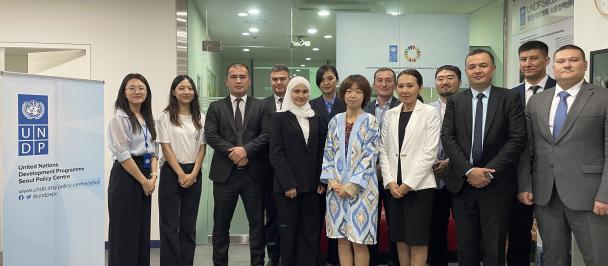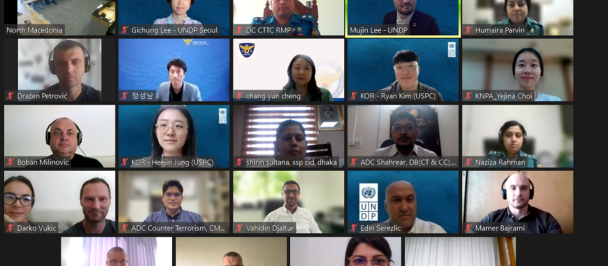‘Training of Trainers’ webinar imparts technical knowledge for localizing Korea’s ‘Clean Portal’ in Mongolia, Kosovo and Uzbekistan
March 6, 2023

REFERENCES TO KOSOVO SHALL BE UNDERSTOOD TO BE IN THE CONTEXT OF UNITED NATIONS SECURITY COUNCIL RESOLUTION 1244 (1999).
UNDP Seoul Policy Centre (USPC) hosted a three-day Training of Trainers (ToT) webinar from 14 to 16 February 2023, jointly organized with the Republic of Korea’s Anti-Corruption & Civil Rights Commission (ACRC) and UNDP Country Offices (COs) of Mongolia, Kosovo and Uzbekistan. The ToT webinar aimed to enhance the technical knowledge and policy insights of CO personnel and relevant government partners for local training and adaptation on ACRC’s ‘Clean Portal’.
The Clean Portal is an innovative digital platform developed and operated by ACRC for reporting corruption and public interest violations. It serves as a one-stop anti-corruption platform for 1,042 public organizations in Korea, providing an effective tracking and monitoring system, in addition to information on rewards and protection provided to whistleblowers, and anti-corruption policies.
On the first day of the ToT webinar series, Ms. Gichung Lee, Policy Analyst at USPC, highlighted how Korea’s Clean Portal is connected to achieving the strategic goals of UNDP stipulated in the Strategic Plan 2022-2025 and Digital Strategy 2022-2025. Ms. Nam Haeng Kim, Deputy Director of ACRC’s Inspection Planning Division, provided an overview of Korea’s Clean Portal by explaining the reporting process, main services provided, noteworthy functions and the international competency of the mechanism. Representatives from COs then discussed and identified the possible challenges in establishing a Clean Portal-inspired mechanism in their respective countries.
Following Ms. Kim’s presentation, Ms. Gulnaz Allaniyazova, Project Analyst at UNDP Uzbekistan, pointed out the currently limited functionality of Uzbekistan’s existing anti-corruption platform, ‘E-anticor.uz’ (http://eanticor.uz), and emphasized the lack of technical expertise in adopting a mechanism based on the Clean Portal approach. Moreover, she elaborated on the need for capacity building of the local staff working in the Anti-Corruption Agency. Ms. Fjolla Raifi, Project Manager at UNDP Kosovo concurred with the importance of local capacity and called for improvements in the existing reporting system, by focusing on citizen-friendly functions such as easy access for whistleblowers to track their case status in Kosovo. Lastly, she addressed the issue of raising awareness among citizens who are the main users of the system. Mr. Bilguun Sukhee, Consultant of UNDP Mongolia emphasized the need to expand the scope of active users to sustain public interest in the reporting mechanism. He expressed a desire to focus on the sustainability of public policies and the political will, mentioning that the draft of the ‘Law on the Legal Status of Whistleblowers’ is in the deliberation process at the Mongolian Parliament.
On the second day, Ms. Kim began the webinar by providing an overview of the timeline required for establishing the Clean Portal. The participants engaged in an interactive discussion on how to overcome potential challenges that may arise during the initial establishment of Clean Portal-inspired systems. First, Ms. Raifi suggested engaging a software company during the reorganization process of the current reporting platform and coordinating a social media campaign to raise awareness in Kosovo. In addition, she mentioned allocating sufficient human resources as a crucial element for the system's success. Ms. Enkhchimeg Enkhsaikhan, Consultant at UNDP Mongolia, emphasized the need for an evaluation of the current system to incorporate national and regional contexts into the new platform and align project goals with government policies. Finally, Ms. Allaniyazova requested advisory support from ACRC and USPC to update the digital corruption reporting platform in Uzbekistan and expressed a specific interest in developing corruption reporting guidance and protection for whistleblowers.
On the final day of the ToT webinar series, the session began with questions on the Clean Portal service from Mongolia, Kosovo and Uzbekistan representatives. Many questions were raised about the legal basis of the system, the capacity building of local staff, awareness raising, the timeliness of complaint processing, and protection for whistleblower identification. In response, Ms. Kim introduced related Korean laws and regulations, such as the ‘Enforcement Decree of the Act on the Prevention of Corruption and the Establishment and Management of the Anti-Corruption and Civil Rights Commission’ and the ‘Public Interest Whistleblower Protection Act’. She described how the ACRC develops essential competencies of staff, as well as effective strategies for promoting the system, such as operating intensive filing periods and promotional campaigns via social media. Regarding the process, Ms. Kim explained that in addition to the privacy that online access to the Clean Portal provides, information regarding each stage of a report is available to ensure reports are being handled properly. Elaborating on the most useful features of the Clean Portal, Ms. Lee discussed the Clean Portal’s Artificially Intelligent (AI) report documentation guide feature. The AI feature analyses keywords used throughout a report, detects potentially relevant laws that have been violated, and proposes a ready-made template that allows civilians to fill in blank information. The AI function is a small yet cost-efficient method of increasing accessibility to corruption reporting services, significantly reducing the time and financial burden of reporting a case of corruption.
This Q&A session was followed by the presentation of local action plans from each CO for implementing Clean Portal-inspired systems. Mongolia proposed a step-by-step roadmap that begins with an assessment of its current whistleblowing framework from a civilian perspective and continues with an evaluation of the legislative changes needed in its system to implement a new reporting mechanism based on the Korean model. Similarly, Uzbekistan proposed a local assessment of its current approach, including a more significant focus on training local personnel to improve the utilization of reporting tools and awareness campaigns to promote the full use of improved services among public institutions and civilians. Lastly, Kosovo expressed its desire to hold collaborative workshops with the Agency of Prevention of Corruption staff to ensure smooth and full implementation of the Clean Portal.
The ToT webinar series concluded with remarks from Ms. Lee, expressing USPC’s commitment to future South-South and Triangular Cooperation (SSTC) among countries partnering with USPC and appreciation for engagement from COs to tackle challenges collaboratively. The event signifies great potential to continue SSTC based on mutual learning opportunities and effective and efficient knowledge exchange via ToT.
* UNDP Seoul Policy Centre (USPC) shares Korea’s tested-and-proven policy tools with other countries through SDG Partnerships. SDG Partnerships provide a combination of support, including partnership development with Korean institutions, seed funding, technical assistance, and policy advisory services. It utilizes UNDP’s global policy network of country offices and the policy expertise and know-how of partner organizations such as ACRC.

 Locations
Locations



